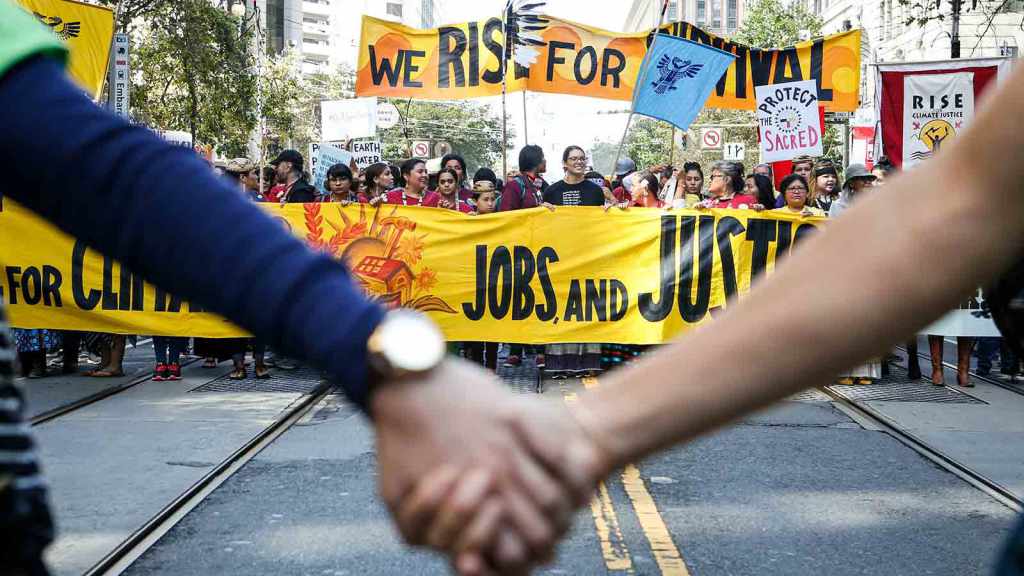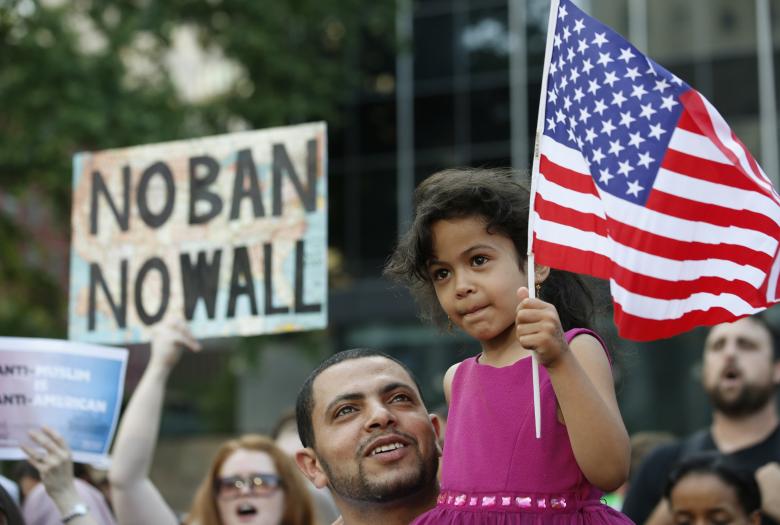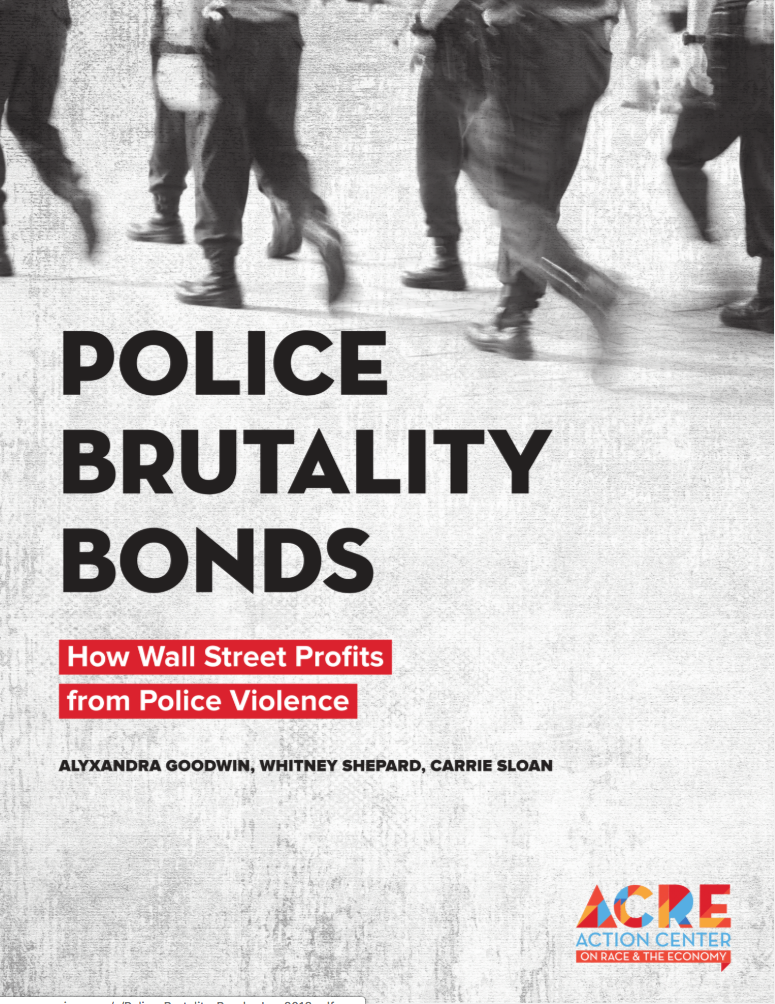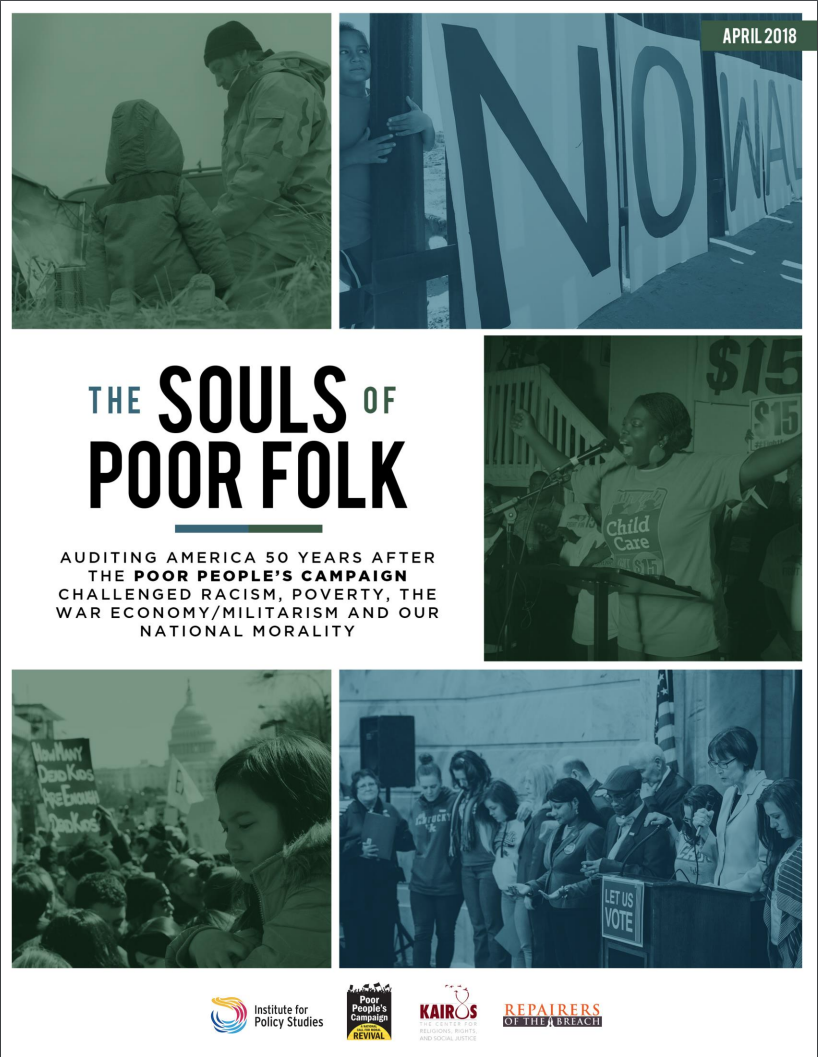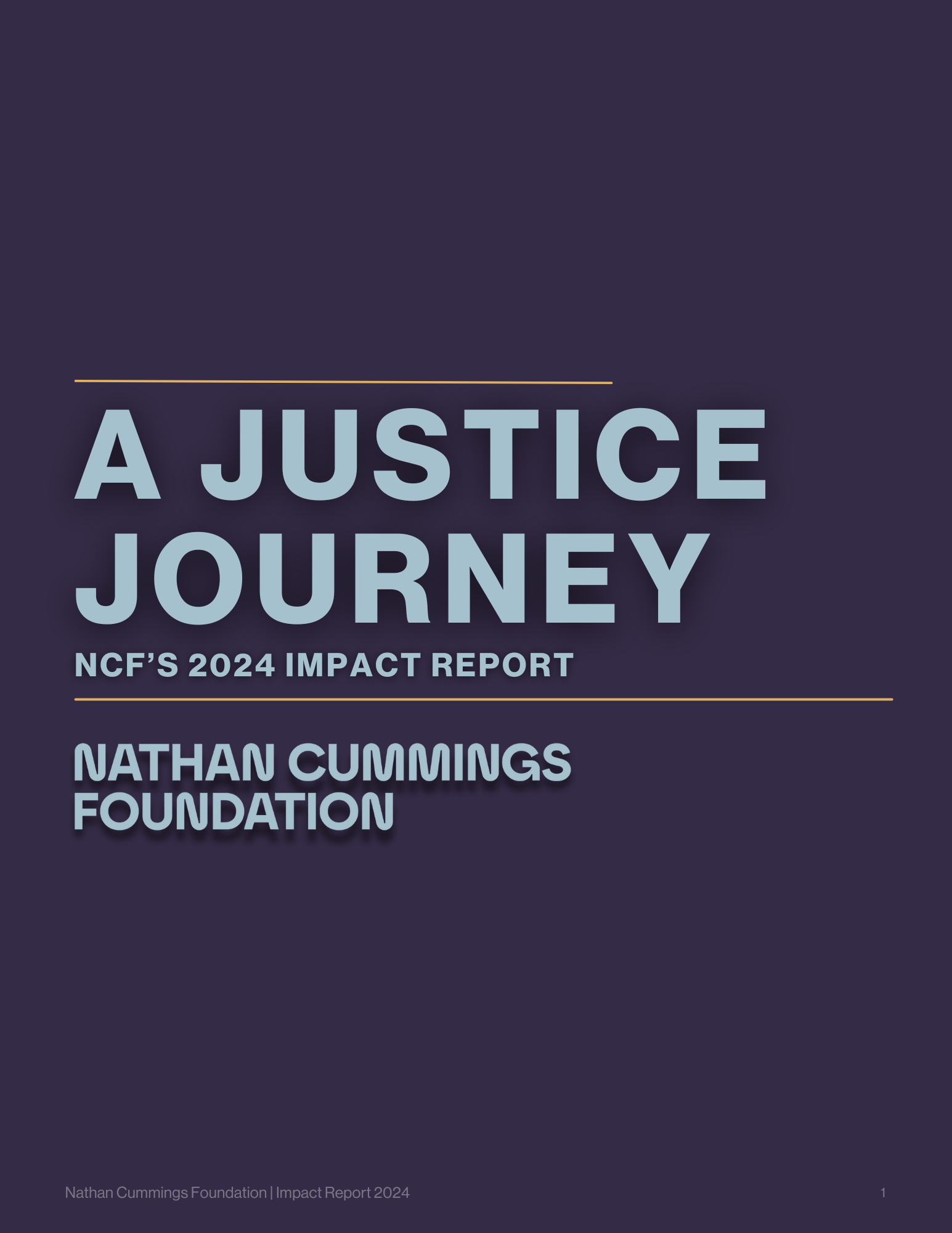Dear Colleagues:
This week, the Nathan Cummings Foundation is joining our partners and leaders representing states, regions, cities, companies, investors and individuals at the Global Climate Action Summit in San Francisco. We are gathering to show a united front in the face of the growing threat of climate change, and to put forward solutions and commitments to transition to a clean, inclusive economy. Heading into the Summit, I am heartened by the momentum from all across society committed to climate change solutions bridging partisan divides.
From the earliest days of our Foundation, the Nathan Cummings Foundation has prioritized the environment with a strong focus on equity. Today, we focus on finding solutions to the two most challenging problems of our time – the climate crisis and inequality – and the linkages between them. In 2015, members of our Board and staff traveled to Paris to COP21 to join our partners and witness this unparalleled moment in climate history. Organizations representing grassroots constituencies emphasized the importance of community-led solutions and reinforced our shared values to pursue environmental solutions that enhance equity and improve people’s lives. The Paris Agreement offered a clear signal to the business community and leaders that the world was ready for a low-carbon future.
We have come a long way since Paris, but there is more work to be done. People are working together to create the breakthroughs we need in the face of the worldwide challenge climate change poses. Frontline leaders from urban, rural and indigenous communities, governors and mayors, businesses, investors, universities and faith leaders are shifting the narrative, creating the political will to address climate change, and lifting up solutions that can transform our economy and win the fight against climate change.
NCF is using all of our assets to achieve our mission and is showing up at the Summit as a grantmaker, an investor, and as stakeholders in this critical fight for our future. We are working to bridge gaps between communities on the ground and policy leaders around the world who are turning the aspirations articulated in Paris into real action, countering the politics of denial and focusing on those most affected by its consequences. Our grantees are creating jobs and new sectors of economic growth, reducing pollution and emissions to improve the health of our communities, and increasing access to low-cost energy. We are proud to stand with them. We are joining their efforts by actively engaging companies on climate change and recently announced our commitment to 100 percent mission-aligned investing.
This weekend, our partners at 350.org helped organize Rise for Climate, a series of marches, rallies and voter registration drives in cities around the world, including San Francisco. At the Summit, NCF partners like the Climate Justice Alliance will engage funders to support diverse leaders and equity-focused solutions at events like the People’s Orientation. The NAACP Environment and Climate Justice Program will explore how the clean energy economy can deliver living wage jobs and inclusive wealth building opportunities, and thought leaders like the UC Berkeley Labor and Climate Center will highlight the role of labor in ensuring a just transition. Our partner Ceres will focus on transformative climate investments and launch the Investor Agenda, a comprehensive guide for investors looking to manage climate risks and opportunities in their portfolios.
Two weeks later at Climate Week in New York City, grantees like NY Renews will join a panel hosted by state senators to highlight how to improve equity as part of New York’s state climate policies. Business Forward will demonstrate how businesses leaders are helping to champion clean energy. And all eyes will be on the Intergovernmental Panel on Climate Change report in early October to understand the latest scientific thinking about climate.
NCF is deeply committed to backing diverse leaders working to ensure that the clean energy transition is just. In a new piece appearing in Grist today Danielle Deane-Ryan, director of our inclusive clean economy program, has conveyed our perspective that transformative change will require a people-centered movement demanding action, leveraging a more powerful political force that combines both the grassroots and the grass tops. In the piece, she highlights how philanthropic foundations have evolved to support greater inclusion of diverse leaders and equity-focused solutions. The Summit is an opportunity to build a more inclusive movement led by those most vulnerable to climate change and to drive more funding to people of color-led organizations. She highlights how partners like the NAACP Environmental and Climate Justice Program, Jobs to Move America and People’s Action are creating strategies to ensure that the necessary transition to a low-carbon future creates shared prosperity.
Together, we can achieve a just transition and build an inclusive clean economy, and NCF is proud to support our partners in their work. I hope to see you in San Francisco!
Warmly,

Sharon Alpert
President & CEO
Nathan Cummings Foundation
Nathaniel Rich has driven much of the summer’s national conversation on climate change with his blockbuster New York Times Magazine piece, “Losing Earth.” Sprawling over more than 66 pages and drawing on more than 18 months of research, Rich tackles the failure of efforts 30 years ago to tackle global warming.
It’s masterful as a piece of storytelling, but Rich’s narrative centers on the unheeded warnings of a small, elite group of scientists and activists. As a result, he misses crucial context and ultimately draws deeply flawed conclusions. And those shortcomings could have serious implications for efforts currently underway to address the still ongoing climate crisis.
What Rich left out is that the mainstream environmental movement – the ecosystem of big green organizations and funders – consistently excluded and failed to provide resources to organizations representing those most vulnerable to climate change: communities of color and low-income communities.
“There can be no understanding of our current and future predicament,” Rich writes, “without understanding why we failed to solve this problem when we had the chance.”
Who exactly is “we” in Rich’s take? Certainly he’s not implicating all of humanity for ignoring a few brave heroes — especially when a key constituency of the environmental movement was seldom included at the table.
Rich’s striking omission is on my mind as we gear up for the Global Climate Action Summit in San Francisco. The summit will bring together a broad coalition of leaders – representing “states, regions, cities, companies, investors, and citizens” – who remain committed to the Paris Agreement and staving off the worst effects of climate disruption. It is an enormous opportunity for catalyzing sustained action in the face of a lack of leadership at the federal level.
But at this massive table of stakeholders, equity-focused movement leaders are largely still fighting for more meaningful seats at the forum — and are instead holding satellite events.
Rich writes that preventing the worst effects of rising temperatures “will take more than good works and voluntary commitments; it will take a revolution. But in order to become a revolutionary, you need first to suffer.”
Communities of color and low-income communities have been suffering. They have the most at stake in a warming world. But too many decisions about how to reverse our course continue to be made, as in Rich’s narrative, within the most exclusive, least diverse circles: the top levels of government, big green NGOs, the C-Suite, and science-based organizations.
The shallow engagement of traditionally excluded communities is the Achilles’ heel of the movement. In 1990 – the year following the period of Rich covers in his reporting – a group of leaders from the more grassroots, people of color-led wing of the movement famously wrote a letter to the 10 most prominent environmental organizations of the time.
The letter decried the groups’ dismal diversity records and their engagement with polluters at the expense of communities of color. “It is impossible for you to represent us in issues of our own survival when you are accountable to these interests,” the leaders write. “Such accountability leads you to pursue a corporate strategy towards the resolution of the environmental crisis, when what is needed is a people’s strategy which fully involves those who have historically been without power in this society.”
In 2014, a generation after that prophetic letter, Green 2.0 — a campaign guided by a diverse, intergenerational working group — collaborated with celebrated environmental movement scholar Dorceta Taylor to take stock of representation in mainstream environmentalism. Its research made headlines for the sad reality that the boards and top executives guiding the movement remained overwhelmingly white, even as the country grew steadily more diverse.
Yes, decades ago a small group of individuals alone was not capable of addressing the climate crisis. However, I remain optimistic that today we – in the fullest sense of the word – are up to the challenge. Transformative change requires a people-centered movement demanding action.
Grassroots organizations, though under resourced, have been rolling up their sleeves to ensure that a transition from dirty to clean energy sources is fair and equitable. Jobs to Move America, for example, is working with labor partners in California to ensure that those manufacturing electric buses are paid living wages. The NAACP is building bridges with international climate justice leaders. And People’s Action in Chicago is fighting to ensure that low-income communities benefit from solar energy policies.
Transformative change will require that our strategies rely on a more powerful political force that combines both the grassroots and the grass tops. As one example among many, a coalition of community-level and mainstream organizations saved California’s landmark global warming bill in 2010 when oil interests tried to brand it a job killer. Equity-focused groups ensured that a meaningful chunk of the billions raised as a result of the legislation would benefit those most affected by climate change.
The task ahead is to harness what the full movement has to offer locally, regionally, and at a national scale. We must focus not only on the necessary transition to a low-carbon future but ensure that the benefits of a transition away from fossil fuels flow to everyone. Research shows that the clean energy economy continues to gain in strength, creating jobs and wealth-building opportunities that can produce shared prosperity.
Some philanthropic foundations, have been evolving to support greater inclusion of diverse leaders and equity-focused solutions at policy-shaping events like the upcoming climate summit in California and driving more funding to people of color-led organizations. (And of course, many funders and NGOs are working on their own leadership diversity.) But many of the largest environmental philanthropies need to accelerate their efforts to match the urgency of the climate crisis.
The stories we tell ourselves about what went wrong will shape the remedies of the future. Apple’s entertainment arm has optioned Nathaniel Rich’s New York Times story – a welcome opportunity to share the tale of our climate crisis with broader audiences beyond the paper’s subscribers. My hope is that this version and other efforts that build on “Losing Earth” will offer a more accurate and inclusive history – one that reflects the contributions of a broader swath of activists and leaders – and guide us toward the right solutions.
Danielle Deane-Ryan is director of the Inclusive Clean Economy program at the Nathan Cummings Foundation. Her multi-sector experience includes serving as the first executive director of Green 2.0 and as a senior advisor to the Obama Administration at the Department of Energy’s Office of Energy Efficiency and Renewable Energy.
For too long, communities across the country have lived with the reality of harmful policing practices and a punitive legal system that relies heavily on criminalization, rather than on crime prevention, restorative practices, and investment. The criminalization of marginalized communities is a cornerstone of our nation’s justice system—from the systemic divestment of social services from communities of color, to “War on Drugs” and “tough on crime” policies of the 1990s, to the proliferation of policing practices targeting minor infractions. This reality is enduring. Indeed, under the Trump administration, communities now find themselves in an era of even more heightened attack.
“In 2016, three community-based organizations that operate in the Texas–Mexico border region collaborated on a participatory research project. A.Y.U.D.A. Inc., Fuerza del Valle Workers’ Center and Comité de Justicia Laboral/Labor Justice Committee trained 36 women from the local communities as surveyors. The surveyors, most of them domestic workers themselves, interviewed 516 housecleaners, nannies and care workers for people with disabilities or for the elderly who work in private homes. The survey was conducted in Spanish and was composed of a standardized set of questions focused on work arrangements, working conditions, the impact of low pay on workers’ lives, injuries and abuse on the job and citizenship status. This report, the result of the surveyors’ hard work knocking on doors, gaining trust and gathering data, is the very first quantitative study of a sizable number of domestic workers in the Texas–Mexico border region.1 The data provides us with a fact-based portrait of the difficult conditions domestic workers in the region face. The report findings will be used to shape ongoing organizing and advocacy to improve conditions and end workplace abuse. Our hope is that it will also shape the thinking of policy makers and encourage further research about working conditions along the border.”
View the full report here.
Dear Colleagues,
For more than 27 years, the Nathan Cummings Foundation has supported movements, organizations and individuals working to create a more just, vibrant, sustainable and democratic society. We are pursuing justice for people and the planet to find solutions to the climate crisis and inequality and create a more sustainable and equitable future for all people.
Like many of you, we have experienced the events of the past month with a growing sense of disbelief, outrage and horror – families torn apart, the villification of Muslims, immigrants and refugees, and a series of devastating court decisions upholding the Muslim ban and putting worker protections in jeopardy.
As a progressive funder rooted deeply in the Jewish tradition of social justice, we’ve seen this before – dismantling of democracy and the protections for some people over others; shifting norms and our laws to enforce and support treating people as less than human. There should be no home in our society for the kind of hate and cruelty we have seen. It is deeply traumatic to rip children from their parents at our borders and morally unacceptable to house them in detention centers, with or without their parents.
We reject the scarcity narrative that seeks to dehumanize and divide our communities, while oppressing women, the poor, black and brown people, Muslims, immigrants and refugees. We have more than enough love and prosperity to share.
We believe deeply in the power of community and the work that partners like People’s Action are doing to create belonging, radical empathy and radical solidarity. We don’t have to keep some people down in order to lift others up. And we should not turn a blind eye to people who come to this country fleeing violence and persecution.
We stand with our partners who are unleashing the power of our democracy. They are showing the power of building unity across movements and giving meaning to the concepts of intersectionality that are core to our work. Mijente is leading demonstrations around the country and JOLT Texas is sending a caravan to the border to create an art installation to inspire hope and highlight the power of Latinx communities to hold the President and elected officials accountable.
Our partners at the National Domestic Workers Alliance are part of a coalition mobilizing women around the country to demand an end to the inhumane separation of families. Thousands have marched in Texas and Washington and thousands more marched this weekend. Recognizing the especially harsh toll that Trump’s immigration policies have on women, our partners at UltraViolet launched a campaign to motivate Congress to oppose Trump’s terrifying style of immigration enforcement.
Our partners ColorofChange, Mijente and the Vera Institute for Justice are working to end the criminalization of all communities of color, recognizing that issues of criminal justice and immigrant justice are intrinsically connected.
We stand with religious and spiritual communities declaring a state of moral emergency and lifting up the progressive faith-based values of justice, equality and community that underpin our democratic values. Faith in Action, Poor People’s Campaign, Auburn Seminary, Bend the Arc, the Religious Action Center, T’ruah, Jews for Racial and Economic Justice and the Anti-Defamation League are showing up at the border and in airports, putting their faith into action. Partners like the Pillars Fund are organizing in Muslim and South Asian communities and speaking out against the discriminatory and anti-American Muslim travel ban. Progressive faith leaders and communities of faith are articulating a unifying vision, taking strategic action and putting themselves on the line to make it manifest.
We stand with journalists, artists and storytellers using their platforms to change our culture and the way we see and feel about each other. They are reframing broken narratives and shedding light into darkness. Our partners at the Center for Investigative Reporting and the Institute for Policy Studies have been diligently chronicling this national tragedy, have been diligently chronicling this national tragedy, pushing the administration to reveal the conditions of people they are detaining sharing their stories. The Opportunity Agenda responded rapidly to develop and share critical messaging.
We recognize that corporations have a role to play in pushing back on these harmful policies. Our partners at the the Interfaith Center for Corporate Responsibility and Business Forward are calling on businesses and investors to stand with Muslim communities in the wake of the travel ban. They represent a spectrum of America’s largest corporations and progressive local business leaders who have actively opposed this policy.
Acting our Values
Together, our partners are raising their voices and standing together to fight back against these policies of hate and division and attacks on the most vulnerable in our society. Their leadership, courage and the magnitude of their efforts calls us all to act on our values and fight for the heart and soul of our country.
To meet their needs, we are putting more resources into the fight through our commitment to leverage our nearly half-billion dollar endowment to 100% mission-aligned investing. And more recently, our Board decided to continue our commitment to increase our payout for a total of five years, which will amount to an additional $14m to support the field.
We are proud to join Grantmakers Concerned with Immigrants and Refugees and more than 200 philanthropic organizations speaking out, shifting the public discourse and responding generously and swiftly to on-the-ground needs.
Despite all the challenges we face, I remain hopeful about our capacity to unleash the power of our democracy to win the longer fight for our values. More people and organizations from across the political spectrum are taking action to heal and repair the fabric of our society. More people than ever are seeing the necessity of a truly multiracial democracy that provides for the economic prosperity of all. Even in these dark times, we know that, when we look closely, a more just society is emerging all around us. Now is the time to keep fighting and to keep up the momentum.
In solidarity,

Sharon Alpert
President & CEO
Nathan Cummings Foundation
Read the Action Center on Race and the Economy report on their groundbreaking research of the link between finance and police violence.
Visit https://www.acrecampaigns.org/pbb for more information.
After the success of the Moral Monday protests, the pastor is attempting to revive Martin Luther King, Jr.,’s final—and most radical—campaign.
The Black Panther dialectic, the MTV News experiment, Vibe, and The Source in their prime: these conversations and platforms show what’s possible when critics of color define the terms of the debate.
Dear Colleagues,
Today, we’re announcing that after two amazing years with the Nathan Cummings Foundation, Loren Harris will move on from his role as vice president of programs and the leader of our racial and economic justice portfolio in August of this year, and that we are beginning two searches during the transition. Loren and his family are making a personal decision to move to the West coast to be closer to family and pursue personal, educational and professional goals.
I, along with the Board and staff, am incredibly proud of the work we’ve done together and am grateful for the amazing contributions Loren has made to NCF’s growth and development. Our Board Chair Ruth Cummings echoed this sentiment, saying: “How fortunate that Loren joined us at the time he did. He enriched new thinking and implementation strategies for NCF’s refined focus areas as a key member of the senior leadership team. He supported the Board’s request for learning opportunities and evaluation strategies. He is the consummate team player, and I believe we are stronger from his example and will continue to be inspired by him as we bring in new leadership for the future. We know he will continue to lead with us even from afar.”
Loren made sure that who we hire and how we work reflects our values.He led the hiring for a diverse and experienced group of program directors and associates for four new focus areas. And in early 2017, Loren convened our partners for an important listening session following the election that informed our Board’s decision to increase the amount of resources going to the field. When we made the decision to increase our giving, Loren helped us stand alongside our grantees and philanthropic partners, and respond to these challenging times with leadership, urgency and impact.
Loren was instrumental in shaping our strategic direction and making progress on racial and economic justice.In 2016, when we shared our Evolving Focus and explicitly named racial and economic justice as an area of focus, we knew that was an important moment of alignment for NCF and a signal of our priorities to the field. Loren introduced new innovation in our racial and economic justice work through an explicit focus on racial and gender justice that recognizes the critical leadership of women of color. He made the case for the need to invest in a virtuous cycle of community wealth building that expands pathways to prosperity and advances an inclusive clean economy. He was also an invaluable partner in our decision to align our nearly half-billion dollar endowment with our mission.
Loren took our focus on collaboration and integration to the next level.Loren came in to help build an integrated team and support the development of interventions that cut across multiple focus areas using policy, market-based, and culture change strategies, creating the breakthroughs we need to drive change. He supported our goal to model new ways for philanthropy to get out of its silos and work across programs. Loren drove exploratory grantmaking in the field of criminal justice, an issue deeply connected to the foundation’s legacy and relationships with partners working on increasing income and wealth for women and communities of color. This new body of grantmaking included new partnerships with theVera Institute, the Action Center on Race and the Economy and the National Academies of Sciences, among others.
Moving forward, we are creating a director of racial and economic justice position and are launching that search today. Nonprofit Professionals Advisory Group will lead the search and we would appreciate your help to share this announcement with your networks. We’ll begin the recruiting process for a new vice president of programs next and will share that description soon. Loren will be with us through August, and will support our recruitment and on-boarding and serve as a resource for these new team members, along with Taina McField and Rachel Fagiano.
Warmly,

Sharon Alpert
President & CEO
Nathan Cummings Foundation
After 15 years of working on shareholder engagement efforts at the Nathan Cummings Foundation, Laura Campos is surprised that more foundations haven’t begun initiatives of their own.
“The Souls of Poor Folk is an assessment of the conditions and trends of poverty today and of the past fifty years in the United States. In 1967, Rev. Dr. Martin Luther King, Jr., alongside a multiracial coalition of grassroots leaders, religious leaders, and other public figures, began organizing with poor and marginalized communities across racial and geographic divides. Together, The Poor People’s Campaign aimed to confront the underlying structures that perpetuated misery in their midst.
Fifty years later, The Souls of Poor Folk challenges us to take a look at how these conditions have changed since 1968. The stark findings draw from a wide variety of sources, including primary and secondary data as well as interviews with and testimonies by people who have been living through and responding to these changes on the ground. The facts, figures, and faces in these pages counter numerous myths about poverty in our society, including two of the most prevalent:
- “Poverty is the fault of the poor”
This report demonstrates that the structural issues of systemic racism, poverty, the war economy and militarism, and ecological devastation contribute more to poverty than individual failures.
- “Despite our nation’s abundance, there is not enough for all of us to survive and thrive”
This report makes a clear case that the richest nation in the world has sufficient resources to protect the environment and ensure dignified lives for all its people.”
Visit https://www.poorpeoplescampaign.org/audit/ for more information.
